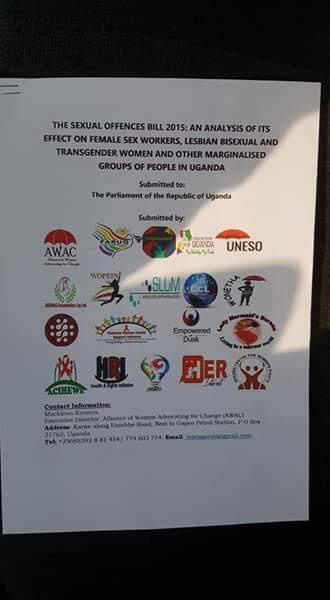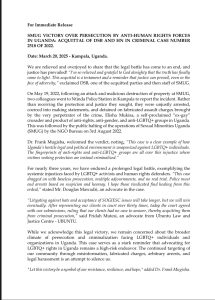ABSTRACT
Sexual violence remains one of the most permissible and widespread crimes against women in Uganda. Police crime reports from as far back as 2011 continue to indicate a growing increase of cases of sexual violence against women and girls in Uganda. According to the Uganda Bureau of Statistics under the Uganda Demographic and Health Survey 2016, the proportion of ever-partnered women aged 15-49 years had experienced intimate partner physical and/or sexual violence at least once in their lifetime.1
This figure is considerably higher for sex workers, lesbians, bisexual and trans women (herein referred to as LBT persons) whose violence is fueled by deep homophobic sentiments, negative perceptions about sex work as well as religious and cultural backings of society. While there are a number of provisions in different laws such as the Penal Code Act that prohibit assault, indecent assault, defilement, rape, attempted rape, etc. the more marginalized and at risk groups in society; adolescent girls and young women, sex workers and LBT persons, continue to be at risk for sex related offences. Furthermore, violence targeting sexual and gender minorities like sex workers and LBT persons is hardly reported in the national statistics due to a number of factors. These sexual offences against marginalized populations have ripple effects for individuals' health, well-being, and human rights.
Women are not a homogeneous group, there are a number of factors that are additionally faced by some women including age, sexual orientation and expression, gender identity, disability, social class, geographical location and many more. For all these factors, it is crucial to deeply understand the specific sexual violence risks and needs of a diversity of women belonging to marginalized groups. Studies show that specific groups of women due to their specific situation are likely to be at a higher risk of gendered violence, their
1
Uganda Bureau of Statistics (UBOS)(2016), The Uganda Demographic and Health Survey 2016,
UBOS: Kampala Accessed at
https://www.ubos.org/onlinefiles/uploads/ubos/pdf%20documents/Uganda_DHS_2016_KIR.pdf
issues are hardly part of the mainstream women‟s rights movements and organizing on GBV or surfaced within legal and policy making processes and may often face barriers in accessing justice, medical care and other services.
According to the Global 2015 Human Development Report, 35% of women globally have experienced physical or sexual intimate partner violence, which impacts on women‟s empowerment. According to United Nations estimates, one in three women world-wide has experienced physical or sexual violence as a result of her sex – with 36.6% of female survivors of domestic violence in Africa.[1] Global estimates published by WHO indicate that almost one third (30%) of all women who have been in a relationship have experienced physical and/or sexual violence by their intimate partner. The prevalence estimates of intimate partner violence range from 23.2% in high-income countries and 24.6% in the WHO Western Pacific region to 37% in the WHO Eastern Mediterranean region, and 37.7% in the WHO South-East Asia region. According to the UN Women Global Database on Violence against Women and Girls in Uganda and the Uganda National Demographic Health Survey Report 2016; lifetime physical and/or sexual intimate partner violence is 50%[2], physical and/or sexual intimate partner violence is at 30%, child marriage is at 40% and while Female Genital Mutilation/Cutting is 1 %.[3] Uganda‟s Gender Inequality Index Rank is at 121[4] while as at 2018[5], Uganda‟s Human Development Index stands at 0.516 and is ranked at 162.
Government of Uganda (GoU) has recognized Gender Based Violence (in all its forms including Sexual Violence) as a public health, human rights and economic issue. In response, Government of Uganda revised its family law in 2000 and its criminal law and Constitution in 2005 to protect and guarantee the rights of women and children and to promote gender equality and equity. Further Uganda has enacted the National Gender Policy in 2007 and the National Gender Policy and National Action Plan on the Elimination of Gender Based Violence in 2016. In addition, there are a number of enabling laws, policies and guidelines towards addressing GBV that include: Employment Sexual Harassment Regulation (2012), Clinical Guidelines for Management of SGBV Survivors (2012), Uganda National Action Plan - Protecting Survivors of Domestic Violence (2011), Land Act (2010), National Strategy to End Child Marriage and Teenage Pregnancy (2005 - 2020), Male Involvement Strategy (2014) and The Domestic Violence Act, The Uganda Gender Policy 2016. The above normative frameworks have provided actors with an opportunity for strengthening the multi-sectoral approach to GBV programming in Uganda. However, despite the existence of the extensive policy framework, there is a disconnect remains between policy and practice. And most importantly, the fact that an enabling right-based Sexual Offences law has not been enacted leaves a number of gaps in addressing sexual violence as well as protecting the rights of sexual and gender minorities.
The Sexual Offences Bill (herein referred to as The Bill) should therefore seek to fill in the gaps missing in the existing laws thereby making the legal framework more adequate and relevant. However, while this Bill is a much needed effort in combating sexual violence, care should be taken not to further marginalize select groups of people by criminalizing their livelihood, their humanity as well as re-criminalizing of the offences whose relevance has been overtaken by the rapid developments in the human rights field and evidence of their unenforceability.[6]
This paper is an analysis of The Bill as it stands, looking at specific provisions that further marginalize adolescent girls, young women, sex workers and LBT persons. It will also take into account the challenges that might be ensued while enacting the law.
INTRODUCTION
The Sexual Offences Bill of 11th December 2015 was tabled in Parliament on 14th April 2016 as a Private Member‟s Bill by Monicah Amoding the then National Female Youth MP, and now MP Kumi Municipality under the umbrella of the Uganda Women‟s Parliamentary Association (UWOPA).
The Object of the Sexual Offences Bill is to consolidate and amend the law related to sexual offences from various enactments, and to provide for procedural and evidential requirements during the trial of sexual offences; To establish the Sexual Offenders Data Bank; To repeal provisions under Part XIV of the Penal Code Act and for other related matters.
The Bill is divided into five parts; The preliminary section which provides interpretation of some of the terms used in the Bill; Part II which provides for sexual offences in general covering offences from rape, unnatural offences, prostitution to incest; Part III provides for sexual offences against children including defilement, child to child sex and child pornography; Part IV provides for special powers of the court and jurisdiction which include powers to award compensation, holding proceedings in camera and the creation of a sexual offences database; and Part V provides for miscellaneous provisions which include provision for extra-territorial jurisdiction, regulations and saving of laws.
The Sexual Offenses Bill is not the first attempt at enacting a Sexual Offences Act for Uganda. The first efforts were spearheaded by the Government of Uganda starting in 2000 with the Sexual Offences (Miscellaneous Amendments) Bill, 2000. In 2011, the Sexual Offences Bill, 2011 was gazetted and later tabled before Parliament in 2012 as the Sexual Offences Bill, 2012.
ANALYSIS: SEXUAL OFFENCES BILL 2015 AND ITS LIKELY EFFECT ON FEMALE SEX WORKERS, ADOLESCENT GIRLS, LESBIAN BISEXUAL AND TRANSGENDER WOMEN AND OTHER MARGINALIZED GROUPS OF PEOPLE IN UGANDA
Positive Provisions of the Sexual Offences Bill
The Bill contains a number of progressive amendments to the law on sexual offences and introduces within certain provisions much needed efforts towards combating sexual violence. The following provisions are welcome developments that if enacted into law protect the rights of female sex workers, adolescent girls, LBT women and other marginalized groups of people:
- The redefinition of the offence of rape as elaborated in Clause 2 and Clause 4
- Provisions for marital sexual assault as elaborated in Clause 2(3)
- Provision for aggravated rape as elaborated in Clause 3
- The explicit pronouncements on sexual harassment as elaborated in Clause 7
- Sexual offences to positions of trust and persons in position of authority as elaborated in Clause 8
- Detention with sexual intent as elaborated in Clause 10
- Improper sexual activity with persons in custody as elaborated in Clause 11
- Sexual act with a person incapable of giving consent as elaborated in Clause 9
- Redefinition of defilement for persons with a mental disability
- The lowering of the standard of proof in sexual offences involving children and;
- Making rape gender-neutral.
Negative and Retrogressive Provisions of the Sexual Offences Bill Nevertheless, there are a few worrying provisions as far as sex workers, LBT women, LGBTI persons, and other sexual and gender minority persons are concerned. These are provisions that seek to further criminalize consensual same sex relations, sex work and lead to further violations of their rights. These are discussed below:
- The Bill defines a sexual act as „direct or indirect contact with the anus, breasts, penis, buttocks, thighs or vagina of one person and any other
part of the body of another person.‟ This definition is broad and rather subjective giving room to several misinterpretations and attendant violations of rights. LBT persons who have been habitually victimized because of the institutionalized homophobia in Uganda are likely to be the biggest victims of this law where homosexual advances have been used to justify homophobic crimes.[7] In a report published by Sexual Minorities Uganda,[8] 264 verified cases of human rights abuses against LGBTI were documented between May 2014 and December 2015. This provision can therefore be used to aid in further perpetuating violence against at most at risk populations and groups of people particularly LBT persons and sex workers under the guise of direct or indirect contact. As such therefore, this definition has to be redefined to address the concerns tabled by female sex workers, LBT women, adolescent girls and other marginalized groups.
- Sexual assault under Clause 6 (1) provides that: „Any person who engages another person in a sexual manner against their will forcefully or otherwise by direct or indirect contact with the anus, breasts, penis, buttocks, thighs or vagina of that person; or exposure or display of his or her genital organs to another person; or with the intention to insult the modesty of that other person utters any word, makes any sound or gesture or exhibits any object, intending that such word or sound shall be heard, or that such gesture or object shall be seen by that person or intrudes upon the privacy of such person commits a misdemeanor…‟ This vague, broad and imprecise definition of a sexual assault is prone to abuse particularly to justify targeted attacks against sex workers and LBT persons as it does not factor in intent. Given the homophobic nature of Ugandan society, this will undoubtedly give room to misuse of this provision. The clause should expressly define the circumstances that constitute the requisite intent.
- Clause 2(3) provides for Marital Rape – its definition and punishment for offenders upon conviction who are liable to not less than one year imprisonment or a fine of not less than 24 currency points (Uganda Shillings Four Hundred and Eighty Thousand Only - UGX. 480,000/=) . According to a 2007 Uganda Bureau of Statistics Report, 68 percent of ever-married women aged 15 to 49 years had experienced some form of violence inflicted by their spouse or intimate partner[9]. The provision on marital rape is therefore important. Considering the heightened vulnerability of women and marginalized persons within the domestic sphere, the prevalence of domestic violence in Uganda, rising impunity and the intricacies involved in escaping from an abusive spouse, marital rape ought to be treated and punished with the same (if not heightened) sense of seriousness as other rape cases [10].
As has been normalized in our society, the expectation is that during marriage, spouses have given unlimited consent to their partners. However, the Bill seeks to remedy this by giving a legal backing to those whose sexual violence is perpetuated by their partners. As it stands now, there are contradictions within the law that still point to prejudices and bias. While rape is punishable by life imprisonment, a person convicted of marital rape is only liable to up to one year‟s imprisonment. The purpose of the law, and consequences to breaking the law should be to deter persons from engaging in such crimes. The inconsistencies in differentiating sentences for convictions of rape and marital rape are discriminatory as it does not provide victims of rape who are married to their perpetrators with equal protection of the law.[11] Already vulnerable groups of people, particularly young women and adolescent girls, sex workers are at risk of suffering marital rape. The law therefore ought to protect all victims with equal measure, which the current provision of the Bill doesn't do.
- The Bill seeks to further criminalize prostitution under Clause 12. The continued criminalization of sex work in Uganda remains a human rights concern. Police and other security organs also use the criminalization of sex work as a reason to commit human rights violations like extortion, arbitrary detention, forced HIV testing, sexual assault, and rape, against sex workers with impunity. The definition of a "prostitute‟ in the Bill does not differ from the definition in the Penal Code Act. As it stands now, the offence of prostitution in Uganda, given the difficulty of proving it, remains one of the most redundant provisions in the law. Police and other agencies turn to other offences such as idle and disorderly to arrest sex workers. The criminalization of sex work only adds other layers of discrimination to sex workers but also further pushes sex workers underground that leads to further discrimination, exclusion and human rights violations. It fuels harassment and stigma attached to sex work thereby creating barriers to their access to justice, health care including sexual and reproductive health services and, protection under the law as provided for in the Constitution.[12] Sex workers are less likely to report cases of sexual violence because of the criminalization of sex work,[13] and yet for tens of thousands of Ugandan citizens, this is a primary way of earning money in an impoverished environment. This is inconsistent with the ideals of equal protection for all before the law.
- The Sexual Offences Bill introduces a new offence under Clause 13 providing that “A person who solicits another in a vehicle, on a street or public place for the purpose of obtaining their sexual services as a prostitute commits an offence…” This attempt to criminalize buyers of sex will only serve to drive sex workers further underground, making it even more unsafe for both those who do sex work, and those who choose to pay for sex.
- Clause 14 and 15 of the Bill also serve to further criminalize sex work by criminalizing third parties engaged in prostitution. As discussed above, the criminalizing of sex work only makes a number of people at higher risk of unsafe sex practices thereby furthering the chance of HIV/AIDS, STIs, rape, and assault among others.
- The Bill under Clauses 16 and Clause 17 provides for unnatural offenses stating that; (a) Any person who has carnal knowledge of any person against the order of nature; (c) Permits a male or female person to have carnal knowledge of him or her against the order of nature, commits an offence and is liable to imprisonment for life.
Clause 17 states that; „Any person who attempts to commit any of the offences specified in Section 16 above commits a felony and is liable to imprisonment for seven years‟.
The insistence on criminalizing same-sex conduct among consenting adults is a violation of established international, regional and national laws that speak to protection of the rights of all people regardless of sexual orientation and gender identity.[1] By rejecting these human rights standards, Uganda only further marginalizes a set group of Ugandans making them susceptible to various violations that include denial of health care and other social amenities, assault and harassment, among others. Further, it represents a regression of Ugandan norms and standards on issues of LGBTI rights, contrary to global trends on LGBTI rights. It should also be noted that given the difficulty in proving the offense of “carnal knowledge against the order of nature,” accused persons are made to undergo the humiliating experience of arrest and examination which undermines their dignity and integrity; even though not a single charge of consensual same sex conduct has ever been successfully prosecuted.[2]
- In its current form, Clause 21 on Disclosure of Sexual Offences will further marginalizes and affect female sex workers, LBT women and adolescent girls who are often arrested and charged with „ the offence of prostitution‟ which, as explained in 4 above; remains one of the most redundant provisions in the law given the difficulty of proving it. Therefore, subjecting a social group of people that are historically disseminated and excluded in employment to disclose conviction of vague sexual offences abuses their right to labour and employment. It is our prayer therefore that this Clause is revised to cater for the issues we so raise.
- Clause 36 of the Bill provides for the establishment of as „Sexual Offenders Database‟. While this is a welcome development in as far as tracking sexual offenders; its current form; The Bill criminalizes some social groups especially Sex Workers (as elaborated in Clause 12, 13 and 14) and LGBTI Persons (as elaborated in Clause 16 and 17). As such therefore, this Data Bank will be used to further marginalize, witching, oppress and abuse the rights of sexual and gender minorities in Uganda that are already excluded and marginalized. And as such has a negative effect on female sex workers and LBT women. We therefore pray that that provision 12, 13, 14, 16 and 17 are removed from the bill so as to give full effect to provisions under clause 36.
CONCLUSION
Uganda is in need of a Sexual Offences bill. However, as discussed above, the current bill continues to leave out a large section of the Ugandan community that are already marginalized. In order to ensure promotion of access to justice especially for at risk victims of sexual assault in Uganda, the law needs to consider the discussed provisions.
The continued criminalization of same-sex relations, sex work among others is contradictory with the attempts to end sexual violence in Uganda. The law needs to take into the account of the reality of all Ugandans. Basing a new law on old draconian laws is both exclusionary and goes against progressive human rights trends that focus on consent and agency in regards to sexuality. In the bid to end all sorts of sexual violence, the legal laws must take into account all persons, particularly those already at risk such as adolescent girls young women, sex workers and LBT persons. The other uphill task that remains is therefore whether if amended and passed, The Bill will be able to be implemented effectively. Key to this is ensuring that police are equipped to strengthen investigative processes and develop standard operating procedures on how to investigate and handle sexual offences. We hope that Parliament considers this opportunity to implement an effective and progressive Sexual Offences Bill that puts Uganda at the forefront of global 2018 norms and trends.




